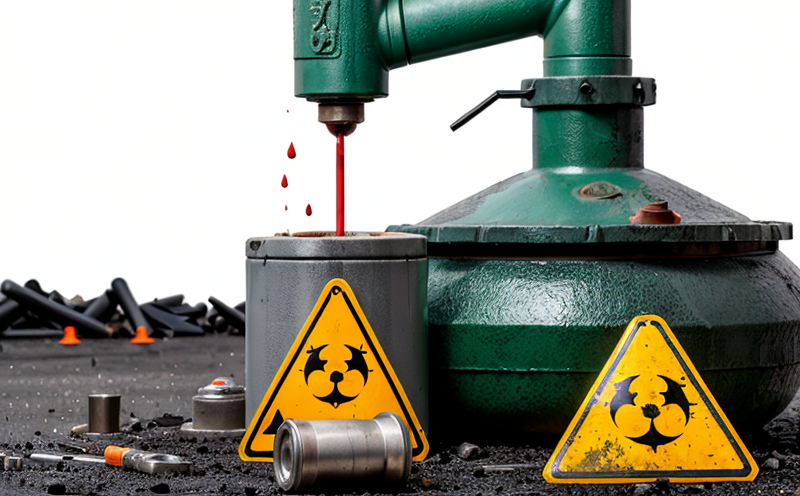Gasoline Hazardous Substance Verification
In today's complex and regulatory-driven environment, ensuring that gasoline meets rigorous safety standards is paramount. The Gasoline Hazardous Substance Verification service provided by Eurolab ensures that gasoline products are free from harmful substances that could pose risks to human health or the environment.
The verification process involves a series of meticulous tests designed to identify and quantify hazardous substances present in gasoline. This includes not only the well-known toxic compounds such as benzene, toluene, ethylbenzene, and xylenes (BTEX) but also other potentially harmful elements like lead, sulfur dioxide, and nitrogen oxides.
The significance of this service lies in its ability to safeguard public health by ensuring that gasoline meets stringent international standards. The test parameters are based on widely recognized guidelines such as the European Union's Directive 2009/128/EC and the American Society for Testing and Materials (ASTM) D4814.
The first step in the verification process is an initial assessment of the gasoline sample, which involves a detailed analysis using advanced chromatography techniques. This helps to identify any unusual or unexpected components that may be present. Once identified, these substances are then quantified using precise analytical methods such as gas chromatography-mass spectrometry (GC-MS) and high-performance liquid chromatography (HPLC).
For the R&D engineers at Eurolab, this service is crucial for ensuring product consistency and quality control. By identifying potential issues early in the development process, they can make informed decisions about ingredient adjustments or production processes.
The compliance officers responsible for regulatory adherence benefit from this service by having a clear understanding of any non-compliance risks associated with their gasoline products. This allows them to take proactive measures to address these issues before facing penalties or recalls.
From the procurement perspective, this service ensures that all raw materials and additives used in gasoline production are safe and compliant. By working closely with Eurolab during the supply chain process, they can verify that each batch of gasoline meets the necessary safety standards.
The importance of this service cannot be overstated; it is a vital component in maintaining public trust and ensuring environmental sustainability.
Why It Matters
The Gasoline Hazardous Substance Verification service is critical for several reasons, particularly within the context of chemical testing. Firstly, it ensures that gasoline meets stringent safety standards set by regulatory bodies worldwide. This not only protects public health but also helps to prevent environmental damage from hazardous substances.
The identification and quantification of BTEX compounds are essential because these chemicals can cause severe health issues if present in high concentrations. They are known carcinogens and have been linked to respiratory problems, cancer, and other serious illnesses.
Lead, sulfur dioxide, and nitrogen oxides are also critical components to monitor due to their environmental impacts. High levels of these pollutants can contribute to air pollution, leading to increased rates of asthma and other respiratory diseases among populations living in affected areas.
In addition to safeguarding public health and the environment, this service helps companies maintain a strong reputation for quality and safety. Consumers today are increasingly aware of the environmental impact of their purchasing decisions, making it essential for brands to demonstrate their commitment to sustainability through transparent testing processes like those provided by Eurolab.
Eurolab Advantages
Eurolab's expertise in Gasoline Hazardous Substance Verification sets us apart from our competitors. Our team of highly skilled chemists and engineers combines cutting-edge technology with decades of experience to deliver accurate, reliable results every time.
Our state-of-the-art laboratories are equipped with the latest analytical equipment, ensuring precise measurements and repeatable results. This allows us to consistently meet the highest standards required by international regulations such as ISO 17025 and ASTM D4814.
We pride ourselves on providing a personalized service tailored to each client's specific needs. Whether you're an R&D engineer looking for insights into your latest fuel formulation or a compliance officer seeking reassurance about your product's safety, we offer the expertise needed to meet these challenges effectively.
Our commitment to excellence extends beyond just meeting regulatory requirements; it also includes continuous improvement and innovation in our testing methodologies. By staying at the forefront of technological advancements, Eurolab ensures that you are always receiving the most accurate and up-to-date information about your gasoline's safety profile.
Environmental and Sustainability Contributions
Eurolab's Gasoline Hazardous Substance Verification service contributes significantly to environmental sustainability by helping to reduce the release of harmful substances into the environment. By ensuring that gasoline meets strict safety standards, we minimize the risk of these pollutants being released during transportation or use.
The reduction in BTEX compounds helps lower the incidence of respiratory diseases and cancer.
Lower levels of sulfur dioxide contribute to cleaner air, reducing the occurrence of acid rain and its associated environmental damage.
Reduced nitrogen oxide emissions help combat global warming by decreasing the greenhouse effect.
Through our commitment to this service, we not only enhance public health but also play a crucial role in preserving natural resources and ecosystems for future generations. By partnering with Eurolab, you are investing in a safer and more sustainable world.





